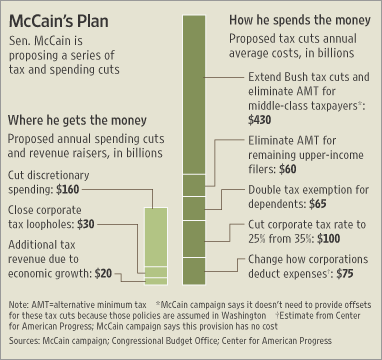I like John McCain and may support him for President. I believe that his proposals to continue the Republican policies of destroying this country's fiscal balance is a political reaction to the political immaturity and denial of the Republican Party more than a reflection on McCain himself.
http://online.wsj.com/article/SB120882415111033181.html?mod=todays_us_page_one
Sen. John McCain is proposing tax cuts that would either cause the federal deficit to explode or would require unprecedented spending cuts equal to one-third of federal spending on domestic programs.
Once thought of as a deficit hawk, the near-certain Republican presidential nominee is now putting more stress on the traditional Republican orthodoxy of tax cuts. Altogether, he proposes more than $650 billion in tax cuts a year, much of it benefiting corporations and upper-income families. That includes the cost of extending tax cuts implemented under President Bush that he voted against twice.
To help pay for it all, the Arizona senator says he would cut $160 billion a year from a federal discretionary budget that totals a little more than $1 trillion. He hasn't specified where the cuts would come from.
With military spending -- about half the total -- likely to rise or perhaps stay even, most if not all of the cuts would have to come from domestic programs. The discretionary budget, which excludes entitlements such as Medicare or Social Security, covers areas such as medical research, federal prisons, border security, student loans, food inspections and much else.
The $160 billion figure is equal to the total budget in 2007 for the departments of Education, Energy, Homeland Security, Justice and State. ...

An analysis of federal spending since 1976 show that there has never been a cut in domestic spending as large as what Sen. McCain is proposing, said Richard Kogan, a senior fellow at the Center on Budget and Policy Priorities. The biggest was in 1982, led by President Reagan, when federal spending was cut by about 17%; most of the cuts were reversed over the next few years, he said. ...
http://online.wsj.com/article/SB120882415111033181.html?mod=todays_us_page_one

